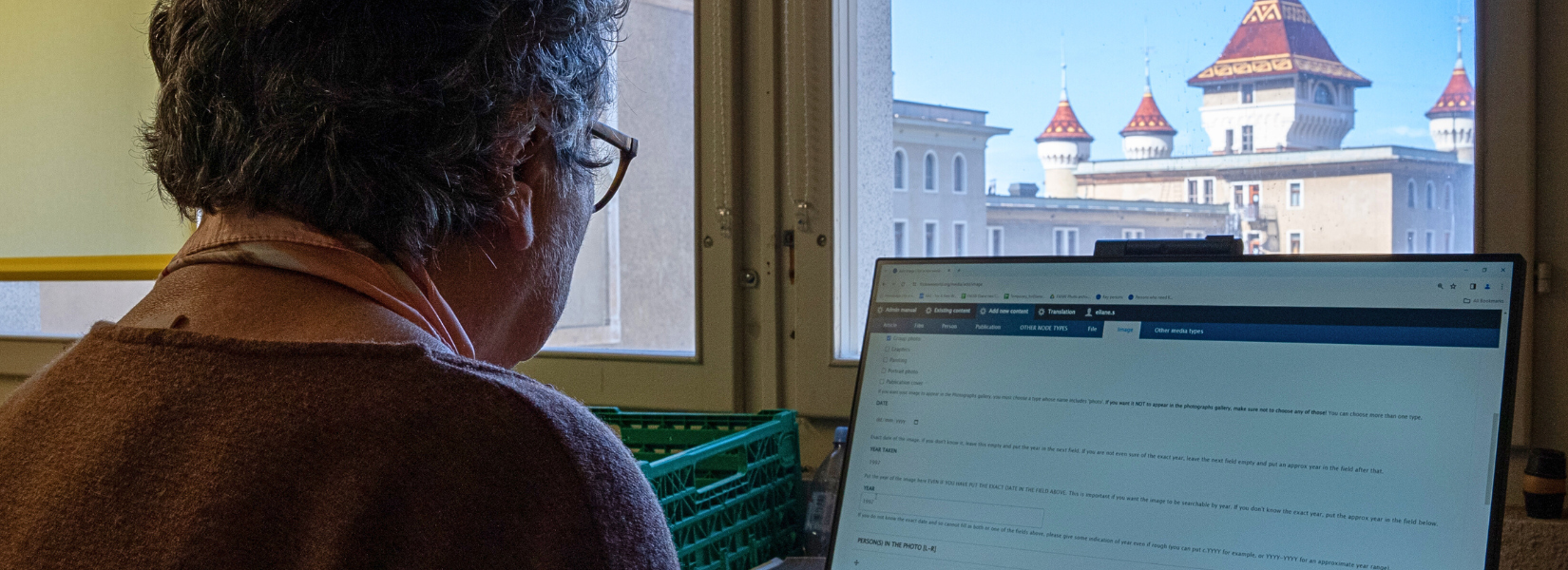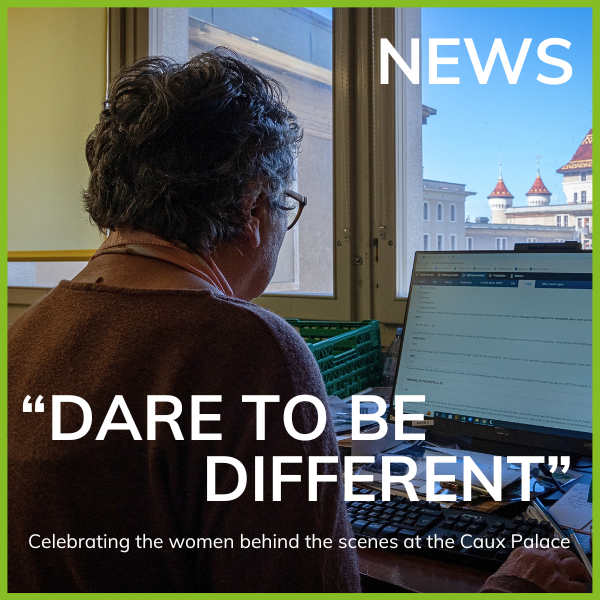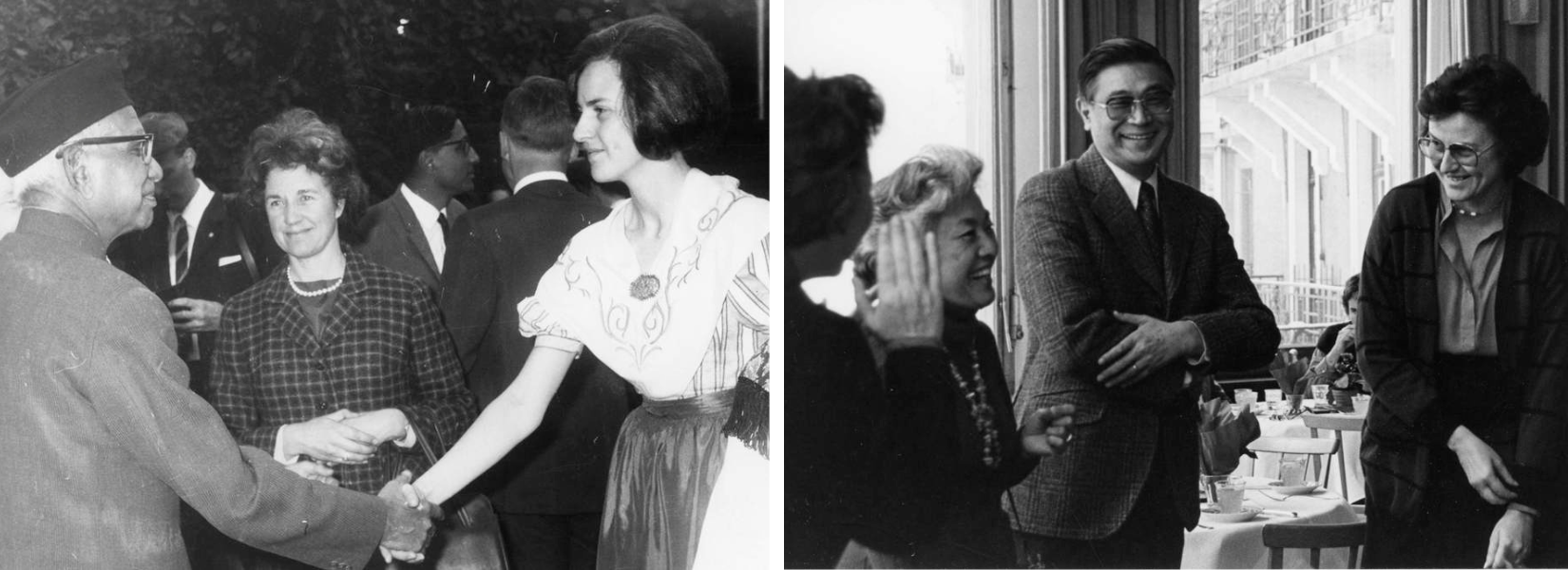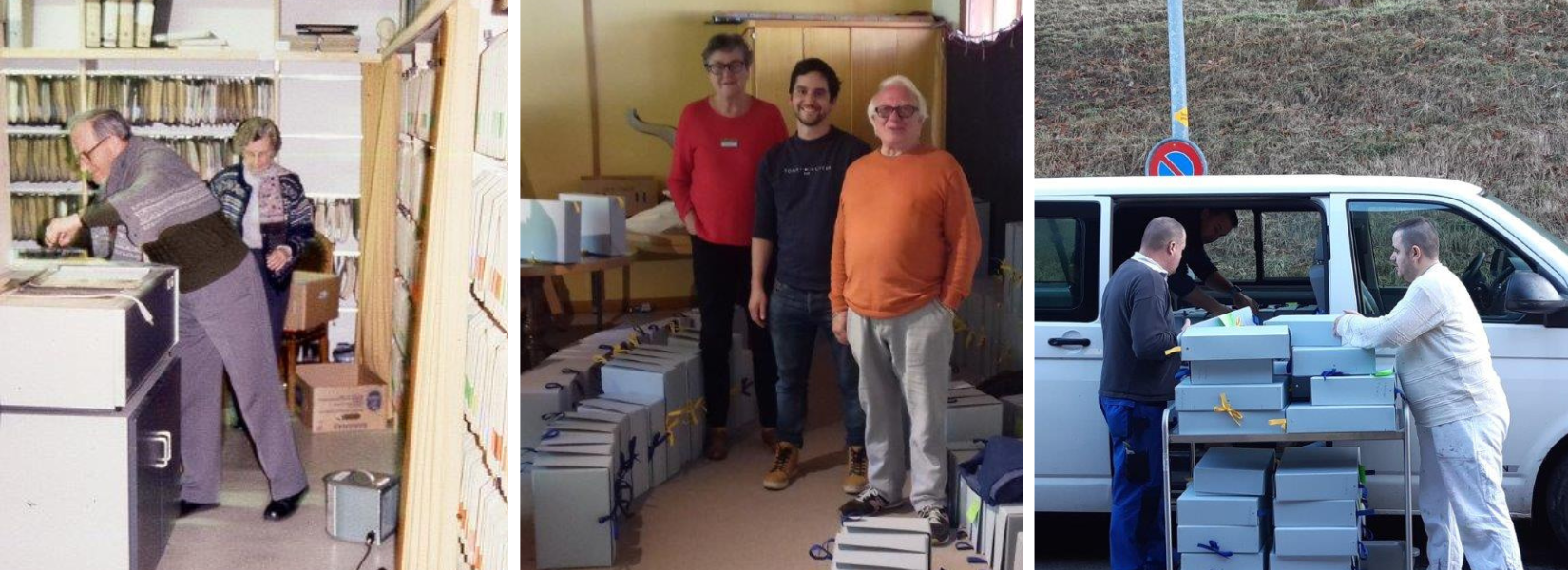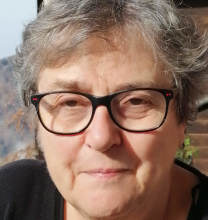"Dare to be different": Celebrating the women behind the scenes at the Caux Palace
28/03/2024
This year, to mark International Women's Day and Women's History Month, we wanted to highlight some of the extraordinary women who have left their mark at the Caux Palace and Caux Initiatives of Change.
One of these women is the Foundation's archivist, Eliane Stallybrass. She gave us access to her very unique world behind the scenes at the Caux Palace, where she has been working since the early 2000s to preserve its rich history and ensure that this part of the Foundation's heritage remains intact and accessible to future generations.
Eliane, what is your current role at Caux Initiatives of Change and when did you start?
Eliane: I've worked as an archivist for the Caux Initiatives of Change Foundation since the early 2000s, and I've just handed over to my successor, Simren Cornut. But I'm still sorting, scanning and cataloguing hundreds of photos.
What other roles have you held in the past?
Eliane: I've done a bit of everything: when I was a young adult, I was part of a musical that travelled all over the world, for example to India, to present the ideas of Initiatives of Change (IofC). I also lived in South Africa during the apartheid era, where I was supported the local IofC team with their projects.
During my time at the Caux Palace, I held a diverse range of roles. I managed accommodation for conference participants, served as a team leader in the dining room, worked as an interpreter, and spoke at meetings and events. Additionally, I handled the center's financial requirements and conducted fundraising activities. For several years, I served as the operations manager for the summer conferences at the Caux Palace. Later, as a member and vice-president of the Caux Foundation, my focus shifted primarily to administrative duties.
Photo right: Eliane (right) with Ambassador Chiba (Japan) and his wife in Caux (photo: Christoph Spreng)
What was your favourite activity?
Eliane: Actually, I didn't have a favourite activity, they came naturally, one after the other.
Could you tell us about the role and position of women within Initiatives of Change in the past?
Eliane: Fortunately, this role has evolved. In the early days, married women travelled a lot with their spouses to take part in the movement's activities around the world. The single women stayed and managed the centres, often looking after the children of those couples who were working abroad with Initiatives of Change. However, if women were part of a show or musical, they travelled, as I did.
In general, the movement was not pioneering in this area. Men seemed to be the leaders and only high-profile women, such as Irène Laure, who had been a member of the French Resistance during the Second World War, had a say.
Has this changed over time, and if so, how?
Eliane: Yes, it has changed a lot, especially with the arrival of the baby boomers. Our generation didn't know the founders of the movement, Frank Buchman or Peter Howard, who had been at the head of Initiatives of Change for a long time, and we brought our own personal touch, with our own initiatives and taking on responsibility.
But the men stayed at the top for a long time. It wasn't until the mid-2000s that the Caux Foundation finally had a female president. Today, I'd say there's no longer any difference between men and women in terms of taking on responsibility.
How have Initiatives of Change - and the activities at Caux Palace - supported your own aspirations as a woman?
Eliane: I don't think I had any particular aspirations at first. We lived in a very different society from today and there were few career opportunities for women.
Initiatives of Change and Caux gave me the opportunity to do a lot of different things: travel, be on stage, lead international work teams, familiarise myself with political and other situations around the world, meet interesting people and sometimes have responsibilities - in short, a whole life that I wouldn't have had if I'd continued in the job I'd trained for, which was teaching.
If you could choose one woman in the history of the world to chat with over a cup of tea - who would it be and why?
Eliane: Perhaps Jacinda Ardern, the former Prime Minister of New Zealand. She was a politician with a lot of empathy for people.
Tell us about the women at Initiatives of Change who worked "in the shadows" behind the scenes.
Eliane: These women had a strong sense of service. They were pragmatic. Without them, the Caux Palace wouldn't have been able to function
Arriving at Caux and finding your room ready, eating a meal after a meeting with vegetables and fruit prepared by a team very early in the morning, drinking tea at 4 o'clock, looking after other people's children, cataloguing the works of art on display on the walls of the Caux Palace, preparing bouquets of flowers - many took all of this for granted, especially the men. But for a very long time, there were only women behind all these tasks. From all over the world, in fact.
Why was it important for you to feature women in the book 75 Years of Stories, which was published in 2021 to mark the Foundation's 75th anniversary?
Eliane: For me, it was an obvious choice. In fact, one of the women behind the scenes was my predecessor, Erika Utzinger, the Foundation's very first archivist. She worked in the secretariat at Caux and was convinced that none of the documents and papers bearing witness to what went on at the Caux Palace should be lost. So, in 1961, she began to put each piece of paper in its right place, by year, by subject, by person.
It's a huge job. Patiently, year after year, she collected everything that was lying around, creating an extraordinary pool of very international material. In 2002, her efforts were rewarded when we moved the first 200 linear metres of Caux Palace history to the Vaud Cantonal Archives in Lausanne. Today, we have already transmitted around 202 linear metres of material, including 63 films and 4.821 meetings that have been digitalized and are now accessible at the Canton Archives in Lausanne and online on the platform For a New World.
What's interesting about Erika is that did not seek the spotlight. She likely never spoke from the platform in Caux, but her work has put the Caux Palace on the map for generations to come.
How do you see the future for women, both at Caux Initiatives of Change and in general?
Eliane: I think things are going well. Women are everywhere, playing their part.
What advice would you give to young women today?
Eliane: Not to imitate men. You have to do your job very well, of course, but always dare to add your own personal touch.
When I was a member of the board of the Caux Foundation, I sometimes had to summon up all my courage to dare to ask a question in a group that consisted almost entirely of men. I was afraid of looking ridiculous. But I often found that the men were happy for me to ask these questions. Often they had been asking themselves the very same questions but hadn't had the courage to say them out loud.
You have to dare to be different.
__________________________________________________________________________________________________________________________
Eliane Stallybrass was born in Lausanne, Switzerland. She studied at the Ecole Normale de Lausanne to become a teacher and began working with Mora Re-Armament (now Initiatives of Change) in 1968. She then joined the cast of the musical "Anything to Declare?. This show was invited to Asia and Australasia. On her return, she spent ten years at the Initiatives of Change centre in Boulogne-Billancourt. From there, she took part in activities in France, Spain, India and Sri Lanka. In the 1970s she helped launch and promote the "Black and White Book", in Finland among other places. She married Andrew Stallybrass in 1980 and they spent just over a year together in South Africa, working alongside the Initiatives of Change team there during the apartheid era. On their return to Switzerland, Andrew and Eliane settled in Geneva, where they worked with a number of UN organisations. Eliane joined the Board of the Caux Foundation in 1981 and served as Vice-President from 1988 to 1997. From 2008 to 2012, she was Director of Operations at the Caux Palace. In the early 2000s, she took over the Caux Palace archives, where she continues to support the Foundation's new archivist.
Gender equality is a goal we must relentlessly pursue. Together, let us unite in solidarity to create a world where every woman can fulfill her potential without barriers. It is by working together, listening to one another, and breaking down persisting barriers that we will build a fairer and more inclusive society for all.
- Discover more stories about the women behind the scenes of the Caux Palace
- Learn more about Ignacio Packer, Executive Director of Caux Initiatives of Change, becoming an International Gender Champion
By Ulrike Ott Chanu
